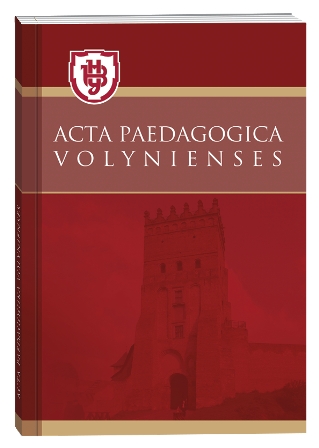AGE FEATURES AND FUNCTIONAL READYNESS OF PRESCHOOL CHILDREN FOR THE FORMATION OF MOTOR SKILLS
DOI:
https://doi.org/10.32782/apv/2021.5.9Keywords:
motor skills, age features, functional readiness, motor activity, preschool childrenAbstract
The initial link in the system of physical education of the younger generations is the physical education of children in preschool education. The foundations of personal physical culture, the foundation of health, physical development and motivation for a healthy lifestyle are laid in each person in the preschool period, are an important prerequisite for physical performance, harmonious development and improvement of motor skills. It is determined that the basic human movements begin to form in preschool age and improve throughout life through the accumulation of individual experience. The problem of preschool children’s motor activity is inextricably linked with the peculiarities of their age development and the functional capabilities of the child's body. It is known that the child's body is constantly evolving, and the level and pace of this development in different periods are different. Periods of increased growth are replaced by its slowdown. Each period of ontogenesis is characterized by its specific anatomical and physiological features. Differences between age groups are determined not only by quantitative but also qualitative features of morphological structures and functional features of individual organs of systems and the body as a whole. In the process of age development, the human body undergoes a variety of changes: chemical, morphological, physical and functional. Age-related changes are determined by the course of intensive metabolic and energy processes, as well as an increase in skeletal muscle tone. It is substantiated that the physical development of a child as a set of morphofunctional features that characterize the age level of biological development, is of great tactical importance in the process of physical education, because it allows to address issues of sports orientation and choice, to regulate certain physical activity. It is established that preschool age is the key in the formation and development of motor function. It is important for the successful formation of motor skills in preschool children to take into account the age and functional readiness of children for physical activity.
References
Антонік В.І., Антонік І.П., Андріанов В.Є. (2009) Анатомія, фізіологія дітей з основами гігієни та фізичної культури: навч. посіб. для студентів ВНЗ; М-во освіти і науки України. Київ : Професіонал : Центр учб. літ., 336 с.
Богініч О.Л. (2001) Фізичне виховання дітей дошкільного віку засобами гри. Київ: СП «ЧИП». 140 с.
Вільчковський Е.С. Курок О.І. (2019) Теорія та методика фізичного виховання дітей дошкільного віку : підручник. Суми: ВТД «Університетська книга», 428 с.
Вильчковский Э.С. (1983) Развитие двигательной функции у детей. Киев : Здоровье, 208 с.
Волкова С.С. (1981) Как воспитать зрового ребенка. Киев : Освита, 164 с.
Загородня Л.П., Тітаренко С.А., Барсуковська Г.П. (2011) Фізичне виховання дітей дошкільного віку. За заг. ред. Л. П. Загородньої. Суми : Українська книга, 272 с.
Кенеман А.В., Хухлаєва Д.В. (1985) Теория и методика физического воспитания детей дошкольного возраста : Учебник для пединститутов. 3-е изд. Москва : Просвещение, 269 с.
Кочерга О. (2007) Особливості фізичного розвитку дітей 4–5 року життя. Психофізіологія дітей 4–5 років. Київ, С. 7–14.
Крестовников А.М. (1961) Очерки по физиологии физических упражнений. Москва : Физкультура и спорт, 529 с.
Лущик І.В. (2007) Фізичне виховання дошкільників. Фізкультурна й оздоровча робота: планування, конспекти занять, методичні поради й рекомендації; Харків : Ранок, 224 с.
Ноткина, H.A. (1995) Развитие двигательных качеств у детей дошкольного возраста. СПб. : ЛОИУУ, 64 с.
Рунова М.А. (2000). Двигательная активность ребенка в детском саду: пособие для педагогов дошкольных учреждений, преподавателей и студентов педвузов и колледжей. Москва : Мозаика-Синтез, 184 с.
Семейкин А.И. Красавина В.Ф. (2011) Основы обучения и развитие движений дошкольников в процесе физического воспитания : Учеб. пособие для учащихся и ст-тов пед. и физ. учеб. заведений, воспит. детских учережд. Омск : Изд-во ОмГТУ, 71 с.
Степаненкова Э.Я. (2001) Теория и методика физического воспитания и развития ребёнка : учеб. пособ. Москва: Академия, 368 с.







